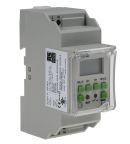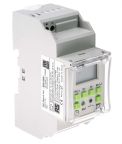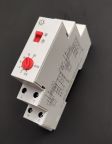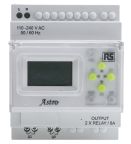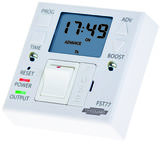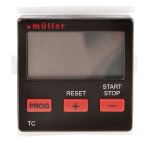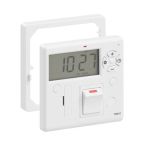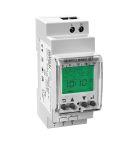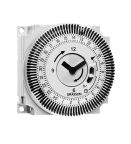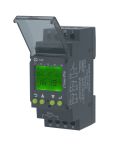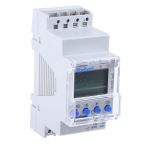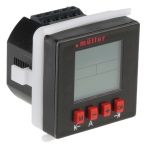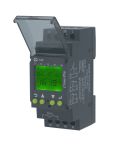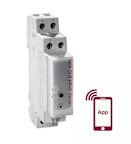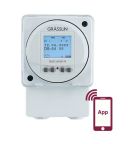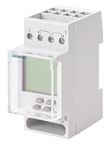Time Switches
Time switches are a testament to the advancements in technology over recent years. These devices offer a range of features and functionalities that make them indispensable in both residential and industrial settings. A timer switch, whether mechanical or digital, allows you to control electrical devices by setting specific times for them to turn on or off, enhancing energy efficiency and convenience. This flexibility is why many people are now considering installing an electric timer switch or digital timer switch in their homes and workplaces.
Types of Time Switches:
- Mechanical vs. Digital:
- Mechanical timer switches use a dial or rotating wheel to set the on/off times. They are simple to use and don't require a power source, making them ideal for basic applications.
- Digital timer switches, on the other hand, offer more precise control with programmable settings and features such as countdown timers and random modes. They are perfect for applications where accurate timing is crucial.
- Analog vs. Programmable:
- Analog timer switches are straightforward, often using a dial to set intervals for devices to operate. They are typically more affordable and easier to use.
- Programmable timer switches provide more versatility, allowing users to set different schedules for different days or times. They are ideal for more complex setups where varied timing is needed.
- Hardwired Timer Switch: These are installed directly into the electrical system, providing a permanent solution for controlling devices. Hardwired timer switches are commonly used for lighting, heating, and other home appliances.
- DIN Rail Timer Switch: Designed for industrial applications, DIN rail timer switches are mounted on a DIN rail within electrical panels. They offer robust control over machinery and equipment, making them suitable for industrial environments.
- Timer Power Switches and Timer Switch Controllers: These provide comprehensive control over electrical devices, allowing users to set multiple schedules and manage power consumption effectively. Ideal for use in both residential and industrial settings.
How Do Electrical Timers Work
Time switches work in a very simple way that anyone can understand. For example, they get plugged into sockets. This happens in-between the actual socket and power plug. Given such an arrangement, it becomes possible for your device to be powered at any time. If you purchase a time switch, there is always information on how it can be used. Its power ratings will also be included. These switches come with a dial. This is what you will use in setting the time they are expected to turn on/off your electrical circuits.
The dial mentioned above carries out functions that are similar to those performed by your clock or watch. Devices will be activated once switches on your dial move forward. In most cases, a time delay switch can be set as many times as you would like.
What is a Digital Timer?
A digital timer switch is a device with built-in electronic or mechanical timers that automatically control the operation of electrical circuits. These timers allow electrical circuits to be turned on and off at specified times, automating many tasks in industrial and commercial settings. For example, a digital timer switch can manage lighting systems, turning lights on and off at predetermined times without manual intervention, making them ideal for energy management in offices, factories, and warehouses.
Digital timer switches are also used to regulate water pumps in swimming pools or control ventilation systems in large commercial buildings. By setting a timer switch controller, users can efficiently manage various electrical systems, ensuring that equipment operates only when needed. This helps reduce energy consumption and wear on equipment.
Benefits of Using Digital/Electrical Timers
You must be wondering about what makes a digital timer switch important. If you don't know, it has lots of benefits that you can experience. Check out some of them below.
Time Switches Can Save Energy
In industrial and commercial environments, energy efficiency is crucial for reducing operational costs. Digital timer switches and electrical time switches can automate the control of lighting, machinery, and HVAC systems, ensuring they operate only when needed.
For example, a hardwired timer switch can turn off lights in warehouses or office buildings after business hours, significantly reducing electricity usage and lowering energy bills. By using a timer power switch, businesses can optimise energy consumption, enhance sustainability, and minimise unnecessary expenses.
Time Switches Can Help Ensure Safety
Safety is a top priority in industrial and commercial settings. Timer switch controllers can help prevent accidents by ensuring that electrical equipment is not left running unattended. For example, in manufacturing plants, a DIN rail timer switch can automatically shut down heavy machinery during off-hours or maintenance periods, reducing the risk of accidents and equipment damage.
Additionally, industrial timer switches can control ventilation systems in hazardous environments, maintaining air quality and ensuring a safe working environment for employees. By using time switches, businesses can enhance safety protocols and prevent potential hazards.
Industry Applications
Time switches are versatile devices used across various industries to enhance efficiency, safety, and energy management. Here are some key applications of timer switches in different sectors:
- Manufacturing: In industrial manufacturing, time switches control the operation of heavy machinery, conveyor belts, and lighting systems. By using industrial timer switches, factories can automate processes, schedule equipment to turn off during non-operational hours, and reduce energy consumption.
- Commercial Buildings: Digital timer switches are widely used in commercial buildings to manage lighting and HVAC systems. They ensure that lights and heating/cooling units operate only when needed, improving energy efficiency and reducing operational costs. Timer switch controllers can also manage outdoor lighting, enhancing security after business hours.
- Agriculture: In the agricultural sector, timer switches regulate irrigation systems, ensuring crops receive the right amount of water at optimal times. They are also used to control lighting in greenhouses and animal enclosures, supporting growth and productivity while minimising manual intervention.
- Public Infrastructure: Time switches are crucial in public infrastructure for controlling street lights, traffic signals, and public facility lighting. Timer power switches ensure that lights operate according to set schedules, conserving energy and reducing maintenance costs.
- Hospitality: In hotels and restaurants, digital timer switches are used to automate kitchen equipment, heating systems, and lighting. This helps maintain a comfortable environment for guests while optimising energy use and ensuring compliance with safety regulations.
- Healthcare: Time switches in healthcare facilities manage the operation of critical equipment, such as ventilation systems, sterilisation devices, and lighting in patient rooms. Automating these systems with electric timer switches helps maintain a sterile environment, enhances patient comfort, and reduces energy waste.
Your Trusted Time Switches Supplier & Manufacturer
At RS, we are committed to being a reliable supplier, distributor, and manufacturer of high-performance time switches. Our extensive range includes timer switches from leading brands, offering digital, mechanical, and programmable options from Schneider Electric, Theben, Grasslin, alongside our trusted RS PRO line. Whether you’re looking for an industrial timer switch to control heavy machinery or a digital timer switch for precise scheduling in commercial settings, our products are built for durability and consistent performance. For more details on our delivery services and fees, please visit our Delivery Page.
Popular Searches
Related links
- Electrical Timers: Types and Best Choices for Outdoor Use
- Light Switch Timers Buying Guide
- Hager Digital Time Switch 230 V ac, 1-Channel
- Timer Relays
- Schneider Electric Timer Light Switch 230 V
- ATC Digital Timer Switch 90 → 270 V ac/dc
- Schneider Electric Digital DIN Rail Time Switch 230 V ac, 2-Channel
- Timer Circuits
